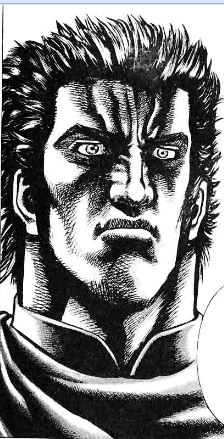Mang Kuangyun: Difference between revisions
No edit summary |
No edit summary |
||
| Line 2: | Line 2: | ||
'''Máng Kuáng-Yún''' ({{CJKV|t=芒 狂雲|j=Bō Kyōun}}) {{flagicon|ROC}}<br />(c.v. [[Kiyoyuki Yanada]]) | '''Máng Kuáng-Yún''' ({{CJKV|t=芒 狂雲|j=Bō Kyōun}}) {{flagicon|ROC}}<br />(c.v. [[Kiyoyuki Yanada]]) | ||
Commonly known as '''Líng-Wáng''' ({{CJKV|t=靈王|j=霊王 Reiō|l=Spirit King}}), Mang Kuang-Yun mastered the forbidden art of {{nihongo|"Pressure Point Displacement"|秘孔変位|Hikō Hen'i}} during his [[Hokuto Sonka Ken|Hokuto Sonkaken]] training | Commonly known as '''Líng-Wáng''' ({{CJKV|t=靈王|j=霊王 Reiō|l=Spirit King}}), Nicknamed "mad dog," Mang Kuang-Yun mastered the forbidden art of {{nihongo|"Pressure Point Displacement"|秘孔変位|Hikō Hen'i}} during his [[Hokuto Sonka Ken|Hokuto Sonkaken]] training. He had to resort to using opium as a means of controlling its power since it proved too much to handle. Planning to travel to Japan in order to battle [[Kenshirō Kasumi]], his master attempted to prevent him because Kuang-Yun's ambitions had turned evil. His master would ultimately fail to seal his pupil's fists and was killed by the Hikō Hen'i technique. | ||
Hikō Hen'i technique | |||
He was promised [[Pān Yù-Líng]] by her adoptive father [[Wēng Hóng-Yuán]] for an assassination of [[Qing Bang]]'s head boss. He suppressed Pān Yù-Líng's memory because of his unrequitted love for her and due to his resentment for Kenshirō Kasumi, who was not only Japanese but also capable of wooing her. Kuáng-Yún dislikes the Japanese due to Japan's role in partitioning and subjugating China in a time of imperialism. | He was promised [[Pān Yù-Líng]] by her adoptive father [[Wēng Hóng-Yuán]] for an assassination of [[Qing Bang]]'s head boss. He suppressed Pān Yù-Líng's memory because of his unrequitted love for her and due to his resentment for Kenshirō Kasumi, who was not only Japanese but also capable of wooing her. Kuáng-Yún dislikes the Japanese due to Japan's role in partitioning and subjugating China in a time of imperialism. | ||
Revision as of 15:19, 19 May 2013

Máng Kuáng-Yún (traditional Chinese: 芒 狂雲Japanese: Bō Kyōun) Error creating thumbnail: /bin/bash: line 1: convert: command not found
(c.v. Kiyoyuki Yanada)
Commonly known as Líng-Wáng (traditional Chinese: 靈王; Japanese: 霊王 Reiō; literally: "Spirit King"), Nicknamed "mad dog," Mang Kuang-Yun mastered the forbidden art of "Pressure Point Displacement" (秘孔変位 Hikō Hen'i) during his Hokuto Sonkaken training. He had to resort to using opium as a means of controlling its power since it proved too much to handle. Planning to travel to Japan in order to battle Kenshirō Kasumi, his master attempted to prevent him because Kuang-Yun's ambitions had turned evil. His master would ultimately fail to seal his pupil's fists and was killed by the Hikō Hen'i technique.
He was promised Pān Yù-Líng by her adoptive father Wēng Hóng-Yuán for an assassination of Qing Bang's head boss. He suppressed Pān Yù-Líng's memory because of his unrequitted love for her and due to his resentment for Kenshirō Kasumi, who was not only Japanese but also capable of wooing her. Kuáng-Yún dislikes the Japanese due to Japan's role in partitioning and subjugating China in a time of imperialism.
He got his wish to "fight someone worthy of taking my life" granted by the Old Taoist Fortune Teller. By the time he had met Kenshiro, he was already dying from a slow decaying death from his self-inflicted pressure points. He fights and loses to Kenshirō Kasumi and later dies due to gunshot wounds from Tian Xue-Fang's men. In his death, he reveals that Yù-Líng was not really killed, but actually had memories of her past suppressed.
He has a heightened sense of hearing much like Kenshirō Kasumi's hearing.
Gallery
Trivia
- Though he physically resembles Raoh, the role of Máng Kuáng-Yún in the story is more similar to Shin from the sequel, Hokuto no Ken. Both are introduced as martial artists able to equal the protagonist (in Shin's case, he was supposedly above Kenshiro due to defeating him in a previous encounter), neither are able to win the love of the protagonist's love interest, both ultimately give up the protagonist's love interest, and both are defeated by the protagonists of their respective series but do not die directly from Hokuto Shinken.




